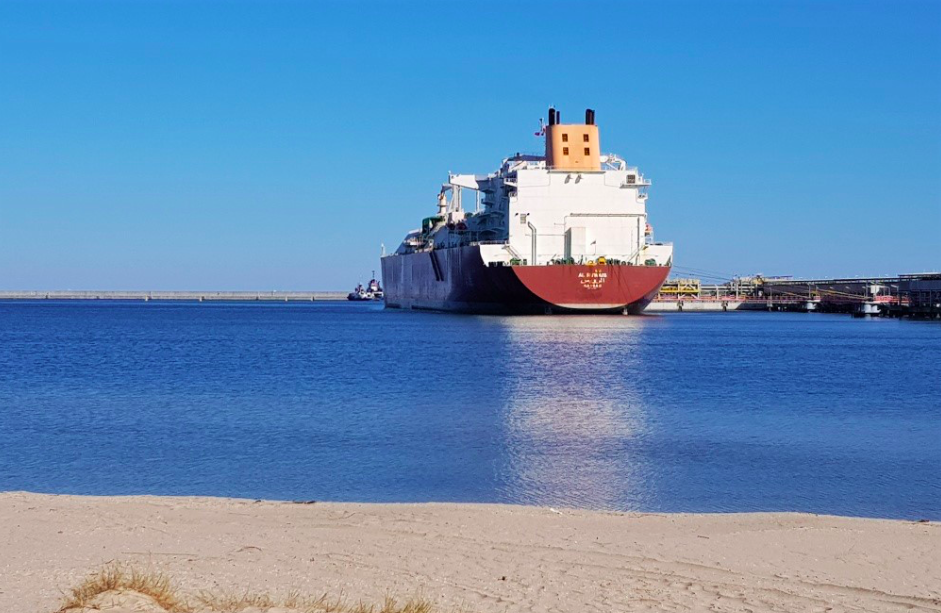Think tanks The Opportunity-Institute for Foreign Affairs and Ignacy Łukasiewicz Institute for Energy Policy presented a report showing that the concentration of generation capacity and import infrastructure in the north of the country has increased Poland’s energy security in recent years. The institutes point to the need to reflect on Poland’s growing energy dependence on the Baltic Sea.
- Poland’s energy dependence on the Baltic Sea is now close to 50 percent. Ensuring energy security is becoming a challenge.
- The Baltic Sea can be described as the arena of modern rivalry between conflicting parties. The threat from Russia to such countries as Lithuania, Latvia and Estonia or even Poland is of an existential nature.
- The ports of Gdańsk, Gdynia, Szczecin and Świnoujście play a key role in granting access to global energy resources and raw materials.
Poland’s energy dependence on the Baltic Sea is now close to 50 percent. In the face of changes in global energy markets and transport routes, as well as geopolitical tensions fueled by Russian hybrid operations in the region, ensuring energy security is becoming a challenge. In a recent report titled „Will the Sea Help? The Baltic Sea and Poland’s Energy Security,” the authors present a comprehensive analysis of the growing importance of the Baltic Sea for the implementation of Poland’s energy policy goals. The document was prepared by The Opportunity – Institute for Foreign Affairs and Ignacy Łukasiewicz Institute for Energy Policy.
A joint report of two think tanks The Opportunity – Institute for Foreign Affairs and Ignacy Łukasiewicz Institute for Energy Policy presented on June 5, 2024 at the conference „Three Seas One Opportunity: New Wave” in Gdańsk, emphasizes that the concentration of generation capacity and import infrastructure in the north of the country has increased Poland’s energy security in recent years. At the same time, it points to the need to reflect on Poland’s growing energy dependence on the Baltic Sea, which by 2040 could increase to 61 percent. The experts ask if Poland’s energy future can be so heavily reliant on a single direction?
„The Baltic Sea can be described as the arena of modern rivalry between conflicting parties. [ … ] The threat from Russia to such countries as Lithuania, Latvia and Estonia or even Poland is of an existential nature,” emphasizes one of the authors of the report, Lieutenant Commander, Rafał Miętkiewicz, PhD., assistant professor at the Naval Academy and expert at the Energy Policy Institute.
Another co-author of the report Mariusz Ruszel, PhD., professor at the Rzeszow University of Technology and president of the Energy Policy Institute, adds that energy security depends on maintaining security and uninterrupted shipping in the region.
The report details the opportunities and challenges associated with the development of energy infrastructure in the Baltic Sea and the Polish coast, including offshore wind farms, import terminals and nuclear power plants. The ports of Gdańsk, Gdynia, Szczecin and Świnoujście play a key role in accessing global energy resources and raw materials, bringing total revenues of PLN 58 billion from taxes, customs duties and excise duties on goods unloaded at the ports to the Polish budget.
„We wanted to look at energy dependence on the Baltic Sea from different perspectives, strategic, economic, political and military. [ … ] Our analysis shows that the Baltic Sea is mistakenly perceived as a „NATO Lake”. This marine environment is not completely safe, and the situation of energy infrastructure in it creates vulnerability to various risks,” emphasizes Zuzanna Nowak, Analysis Director in the Opportunity Institute and initiator of the report.
The report also argues that Russia is actively seeking asymmetric and hybrid measures to compensate for the unfavorable strategic situation in the Baltic states. „Therefore, it is fundamental to increase the resilience of energy infrastructure as part of a coherent national and international policy and to ensure multi – level security – physical and cyber,” the authors emphasize.
„It is crucial for Poland and other countries in the region to build political relationships and energy infrastructure that will enable the continuity of supply through alternative routes in a crisis situation,” concludes Mariusz Ruszelski, PhD.
Compiled by Jędrzej Stachura









